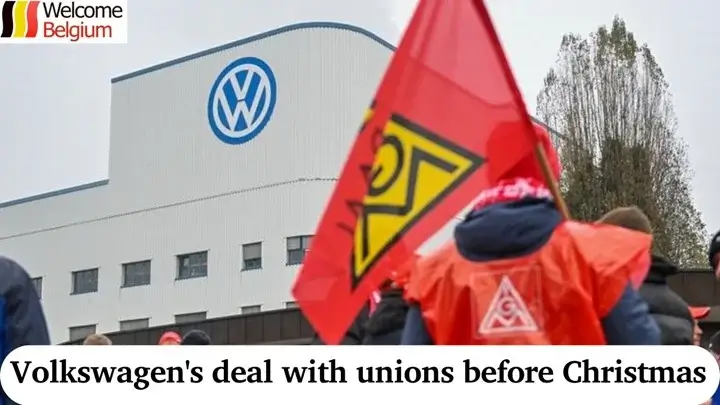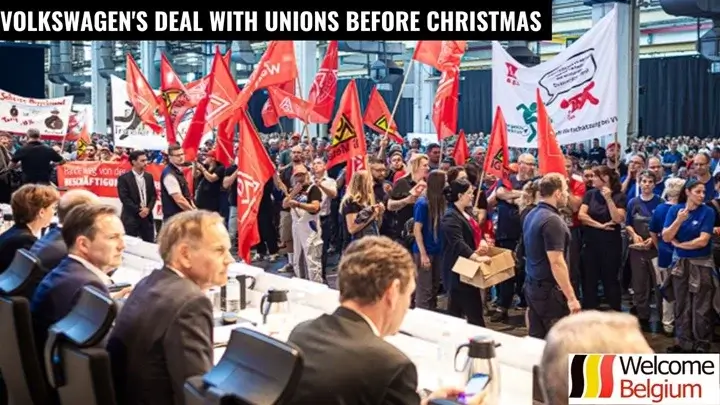At Volkswagen, negotiations with unions are ongoing, with the aim of reaching an agreement before Christmas. Workers are demanding better working conditions and higher wages amid global changes in the auto industry. A possible agreement is critical to the stability of the company, especially in the context of the transition to electric vehicles and other major reforms.
About the current situation
A conflict with trade unions is brewing at Volkswagen in Belgium over demands for better working conditions and higher wages. The conflict began in response to changes in the company’s policy aimed at optimizing costs and moving to new technologies. Workers are dissatisfied with job cuts and the lack of attention to their safety and working conditions. At the same time, Volkswagen is trying to reach a compromise and avoid long strikes so as not to disrupt production processes.
List of problems and their causes:
- Job losses: Reduction in the number of employees due to production optimization and the transition to new technologies such as electric vehicles.
- Poor working conditions: Workers say their demands for improved safety and working conditions are ignored.
- Inability to reach a compromise: Disagreements over wage increases and improved social benefits.
- Dissatisfaction with new production process: Workers express concerns about the introduction of new technologies and the possible deterioration of working conditions.
At the moment, the situation remains tense, and both sides continue to seek ways to resolve the conflict. Volkswagen is trying to reach an agreement with the unions in order to avoid mass strikes and maintain stability in the company. At the same time, the unions continue to insist on better working conditions, which makes reaching an agreement before Christmas extremely important for both sides.
Prospects for agreement before Christmas
Negotiations between Volkswagen and trade unions in Belgium are continuing amid growing worker demands. Both sides are responsible for the negotiations: trade union representatives and company management. The key is to reach an agreement before Christmas, which is linked to the need to stabilise working relations in the context of global changes and economic difficulties.
Prospects:
- Tensions are rising. If unions do not receive satisfactory offers, further protests and strikes are possible.
- Agreements on wages and working conditions. The main focus is expected to be on improving wage conditions and work safety.
- Impact on the company’s image. A quick agreement with the unions will help to strengthen the trust of workers and the public, while protracted negotiations could damage Volkswagen’s reputation.
- Prospects for the electric vehicle transition. The negotiations may touch on the issue of influencing the company’s plans to switch to green technologies, which is also important for employees.
- Risks to jobs: If the parties fail to reach an agreement, a negative outcome in the form of layoffs and job losses is possible.
A positive development would be a quick resolution of the conflict and the establishment of stable working conditions, which would help the company focus on its long-term goals. However, if negotiations drag on, this could lead to additional difficulties and tensions, which would negatively affect both the employees and the company’s overall position in the market.
The Future of Volkswagen in Europe
Volkswagen faces many challenges in Europe, including the transition to electric vehicles, increasing environmental requirements and growing competition. As part of its strategy to transition to sustainable transport, the company is investing heavily in the development of electric vehicles and charging infrastructure. This requires changes in production capacity, which also affects jobs and labour relations. The transition to electric vehicles could be a decisive factor for Volkswagen in ensuring long-term competitiveness in the market.
However, the company must also take into account the social and economic conditions in the European market. The influence of trade unions and workers’ demands for better working conditions and higher wages remain important aspects for successful operation in the region. Coordination with trade unions will help to avoid social protests and maintain stability in enterprises, which is especially important in a changing market and economic uncertainty.





